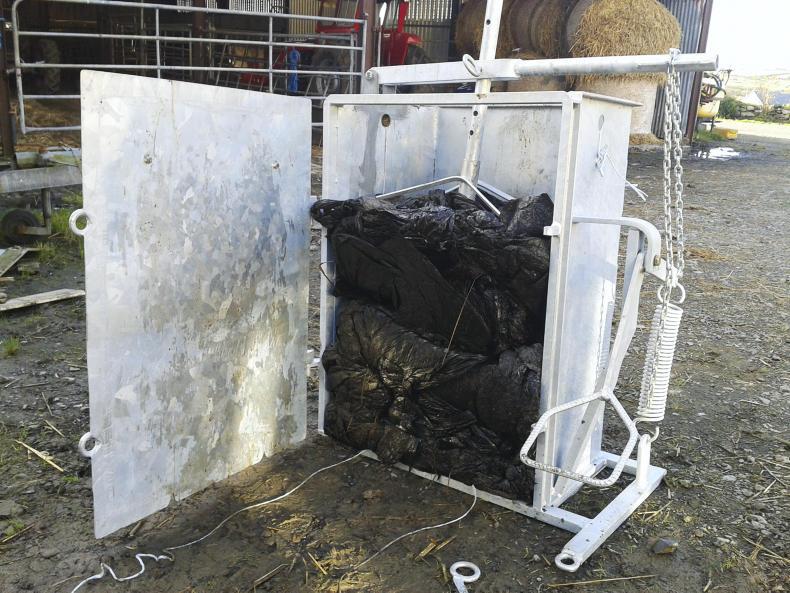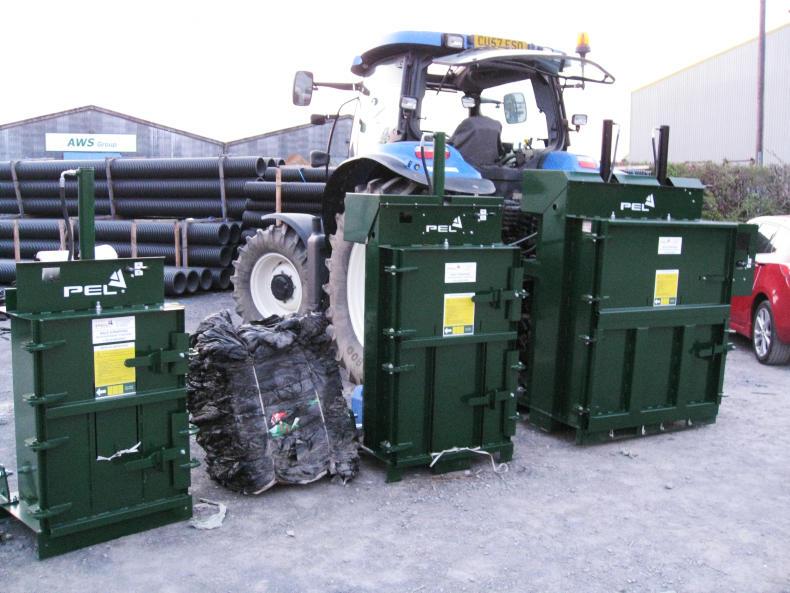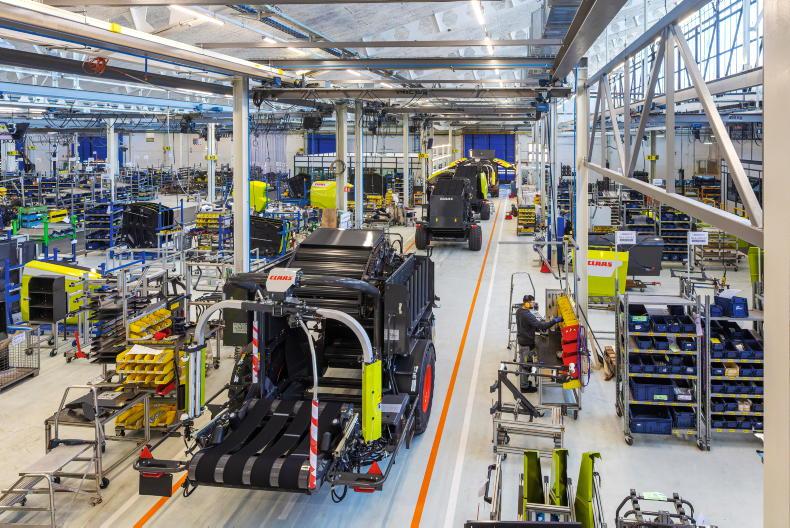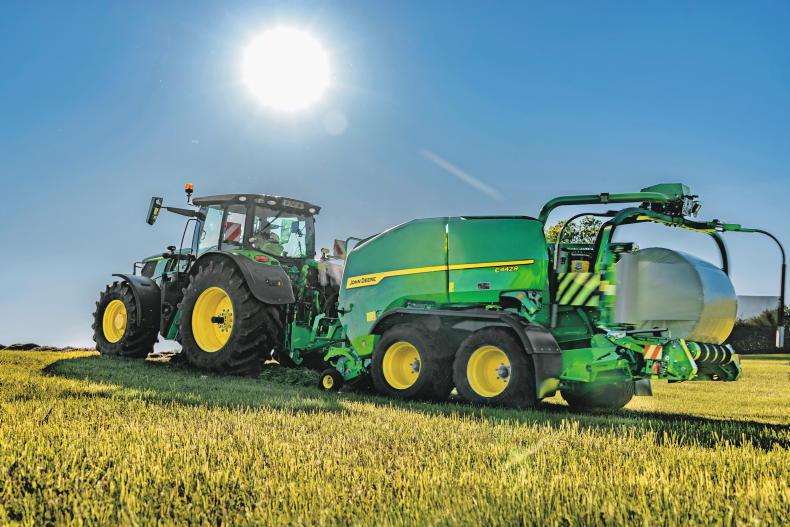Every year at housing, the issue of where and how to store silage plastic comes up. For a lot of farms it will inevitably be stored in a corner of the farmyard somewhere until it is time for recycling. This can become very unsightly but what’s more, can end up costing you more money. This is because when silage wrap is being recycled the cost is usually calculated by weight. If plastic wraps are left outside in a heap exposed to the rain they will become very heavy and difficult to handle. Ideally plastic should be stored indoors out of the rain and it should be separated from bale netting. Where indoor storage is not possible, there are other options available to help improve the presentation of plastic all the while storing it outdoors.
Some farmers have built special covered huts for storing plastic in an effort to keep them dry and neat. Below we have listed three products on the market designed to do just that. The balers are designed to condense numerous wraps into one compact heap, so even if the finished bale is stored outdoors it is less likely to soak in water.
Healy silage wrap baler

Healy silage wrap baler.
Edward Healy from Milltown Malbay, Co Clare has been developing manual silage wrap balers for five years now. His baler can handle 30 to 40 silage wraps and produces a finished bale the size of small square bale of hay but weighs 50-80kg. The weight varies depending on the number of wraps used and whether or not the plastic was wet. Edward says it is up to the farmer how many wraps they want to put into the bale.
“Some farmers only put in 20 wraps to make it easier for moving,” he explained. The baler is operated via a spring-loaded device which is controlled by a foot pedal. “Baling twine is put in position first in the basket, the wrap is then loaded into the basket and the forcing plate is positioned on top of the load. When loaded to the desired level the foot pedal is pushed down, this extends the spring, when the pedal is released again the spring contracts and pulls the chain connected to the lever bar which, in turn, drives down the forcing plate and packs the plastic,” Edward explained. The silage wrap baler costs €650, it can also be used for baling silage netting.
PEL agri wrap balers
PEL who are based in Balla, Co Mayo manufacture hydraulic-powered silage wrap balers driven by a tractor. There are three sizes available, the PEL 200tr can bale approximately 40 to 50 wraps. The PEL 700tr can bale approximately 60 to 80 wraps and the PEL 1500tr (contractor model) can bale 150 to 190 wraps. Baling of the silage wrap can be carried out while on the three-point linkage or the machine standing alone. Pearce Gibbons from PEL says most farmers park the agri wrap baler in close proximity to where the silage is being fed.
“Plastic can be loaded into the chamber and when the chamber is full the plastic can be compressed down by hooking up the PEL baler to the tractors hydraulics,” he explained. According to Pearce each machine is CE certified and is of robust heavy duty construction.
There is also an indicator which lets the operator know when the bale is made. Special nylon strapping provided by PEL is supplied with each baler and the balers have an easy tie system to ensure bales can be tied off with ease, according to Pearce. Each bale requires approximately 1m of strapping.
“For the majority of our customers, the rolls supplied with new PEL balers will last a number of seasons,” said Pearce. He said the PEL 1500tr model has an automatic tipping system to remove the bale from the baler chamber when the bale is complete.
“One novel idea we came across since we started producing these machines was farmers using these plastic bales to make penning for sheep,” said Pierce.
He said the larger 200kg bales are ideal for that task. The balers can also be used for baling silage netting, meal bags and plastic containers. The balers’ prices start from €1,500 excluding VAT up to €3,800 excluding VAT, a roll of strapping costs €19 excluding VAT. Prices vary depending on size and there are optional extras such as lighting for operating during dark winter months.
JFC tidy wrap recycling bin

JFC tidy wrap recycling bin.
JFC has developed a special container called Tidy Wrap for storing silage wraps dry and tidy. The bin is retailing at approximately €300 including VAT. It can store 100 to 150 round bale wraps.
JFC claims it is beneficial to farmers because wraps are kept dry, which they say helps to keep recycling costs down. Storage is also tidier compared with stockpiling plastic in the corner and transportation is improved.
To use the container, farmers cut the first bale wrap carefully to create an insert (similar to a bin liner). They then pack wraps into the container.
When it is full, the top of the insert wrap is tied and the container is removed, this is easily done because the bin is open ended.
A package similar to a wrapped bale is left which they claim is easy to transport.
Every year at housing, the issue of where and how to store silage plastic comes up. For a lot of farms it will inevitably be stored in a corner of the farmyard somewhere until it is time for recycling. This can become very unsightly but what’s more, can end up costing you more money. This is because when silage wrap is being recycled the cost is usually calculated by weight. If plastic wraps are left outside in a heap exposed to the rain they will become very heavy and difficult to handle. Ideally plastic should be stored indoors out of the rain and it should be separated from bale netting. Where indoor storage is not possible, there are other options available to help improve the presentation of plastic all the while storing it outdoors.
Some farmers have built special covered huts for storing plastic in an effort to keep them dry and neat. Below we have listed three products on the market designed to do just that. The balers are designed to condense numerous wraps into one compact heap, so even if the finished bale is stored outdoors it is less likely to soak in water.
Healy silage wrap baler

Healy silage wrap baler.
Edward Healy from Milltown Malbay, Co Clare has been developing manual silage wrap balers for five years now. His baler can handle 30 to 40 silage wraps and produces a finished bale the size of small square bale of hay but weighs 50-80kg. The weight varies depending on the number of wraps used and whether or not the plastic was wet. Edward says it is up to the farmer how many wraps they want to put into the bale.
“Some farmers only put in 20 wraps to make it easier for moving,” he explained. The baler is operated via a spring-loaded device which is controlled by a foot pedal. “Baling twine is put in position first in the basket, the wrap is then loaded into the basket and the forcing plate is positioned on top of the load. When loaded to the desired level the foot pedal is pushed down, this extends the spring, when the pedal is released again the spring contracts and pulls the chain connected to the lever bar which, in turn, drives down the forcing plate and packs the plastic,” Edward explained. The silage wrap baler costs €650, it can also be used for baling silage netting.
PEL agri wrap balers
PEL who are based in Balla, Co Mayo manufacture hydraulic-powered silage wrap balers driven by a tractor. There are three sizes available, the PEL 200tr can bale approximately 40 to 50 wraps. The PEL 700tr can bale approximately 60 to 80 wraps and the PEL 1500tr (contractor model) can bale 150 to 190 wraps. Baling of the silage wrap can be carried out while on the three-point linkage or the machine standing alone. Pearce Gibbons from PEL says most farmers park the agri wrap baler in close proximity to where the silage is being fed.
“Plastic can be loaded into the chamber and when the chamber is full the plastic can be compressed down by hooking up the PEL baler to the tractors hydraulics,” he explained. According to Pearce each machine is CE certified and is of robust heavy duty construction.
There is also an indicator which lets the operator know when the bale is made. Special nylon strapping provided by PEL is supplied with each baler and the balers have an easy tie system to ensure bales can be tied off with ease, according to Pearce. Each bale requires approximately 1m of strapping.
“For the majority of our customers, the rolls supplied with new PEL balers will last a number of seasons,” said Pearce. He said the PEL 1500tr model has an automatic tipping system to remove the bale from the baler chamber when the bale is complete.
“One novel idea we came across since we started producing these machines was farmers using these plastic bales to make penning for sheep,” said Pierce.
He said the larger 200kg bales are ideal for that task. The balers can also be used for baling silage netting, meal bags and plastic containers. The balers’ prices start from €1,500 excluding VAT up to €3,800 excluding VAT, a roll of strapping costs €19 excluding VAT. Prices vary depending on size and there are optional extras such as lighting for operating during dark winter months.
JFC tidy wrap recycling bin

JFC tidy wrap recycling bin.
JFC has developed a special container called Tidy Wrap for storing silage wraps dry and tidy. The bin is retailing at approximately €300 including VAT. It can store 100 to 150 round bale wraps.
JFC claims it is beneficial to farmers because wraps are kept dry, which they say helps to keep recycling costs down. Storage is also tidier compared with stockpiling plastic in the corner and transportation is improved.
To use the container, farmers cut the first bale wrap carefully to create an insert (similar to a bin liner). They then pack wraps into the container.
When it is full, the top of the insert wrap is tied and the container is removed, this is easily done because the bin is open ended.
A package similar to a wrapped bale is left which they claim is easy to transport.











SHARING OPTIONS